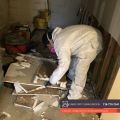
Efflorescence is a common issue found on the surfaces of bricks, concrete, stone, and other building materials. It often appears as a white, powdery substance that can affect the appearance of walls and structures. While it is sometimes mistaken for mold, efflorescence has different causes, implications, and solutions. Knowing how to distinguish between efflorescence and mold can be crucial for property owners, buyers, and Realtors alike.
Efflorescence is a crystalline deposit of salts that can form on the surface of building materials, such as bricks, concrete, and stone. It occurs when water migrates through a porous material, dissolving soluble salts present in the material or the surrounding environment. As the water evaporates from the surface, these salts are left behind, creating a white, powdery residue.
Key Characteristics of Efflorescence:
- Appearance: White, powdery, or chalky deposits on surfaces
- Location: Often found on exterior walls, basements, and other areas prone to moisture
- Feel: Dry and powdery, unlike the typically moist and fuzzy appearance of mold
Is Efflorescence Harmful?
Efflorescence is generally not harmful to health, as it does not produce spores or toxins like some molds. However, it can indicate underlying moisture issues, which may lead to more significant structural problems if left unaddressed. While efflorescence itself is not hazardous, excessive moisture in building materials can lead to mold growth, deterioration, and potential weakening of the structure.
Efflorescence results from a combination of three factors:
- Water: Moisture is essential for efflorescence to occur. Water dissolves the salts present in materials or nearby soil and transports them to the surface.
- Soluble Salts: These salts can come from within the building material itself or from the environment, such as soil or mortar.
- Porous Building Materials: Materials like brick, concrete, and stone are porous and allow water to pass through, carrying the salts to the surface.
When these three factors are present, efflorescence can develop on the surface of a structure.
Efflorescence on Different Building Materials
Efflorescence can appear on a variety of building materials:
- Bricks: Commonly seen on brick walls and structures, efflorescence on bricks often occurs after rainfall or when there is rising dampness.
- Concrete: Efflorescence on concrete surfaces, including basement walls and floors, is frequently due to groundwater seepage or excessive moisture.
- Stone Materials: Natural stones, particularly those with high porosity, can develop efflorescence, especially if they are exposed to constant moisture.
Solutions for Efflorescence
To address efflorescence effectively, it’s essential to tackle both the immediate deposits and the underlying moisture sources:
- Surface Cleaning: Efflorescence can often be removed by dry brushing the surface with a stiff brush. In some cases, a mild acid solution (like vinegar diluted with water) may be used to remove persistent deposits.
- Reducing Moisture: Addressing the source of moisture is critical to preventing efflorescence from recurring. This may involve:
- Improving drainage around the foundation
- Sealing cracks in basement walls and floors
- Ensuring proper ventilation, especially in basements and crawl spaces
- Waterproofing: Applying a waterproof sealant to surfaces can prevent water from penetrating and carrying salts to the surface.
Difference Between Efflorescence and Mold
Though efflorescence and mold can appear similar, there are key differences:

Bay Area Mold Pros: Mold Inspection, Testing & Analysis Services
While efflorescence is typically harmless, mold poses significant health risks. That’s why Bay Area Mold Pros focuses on providing professional mold inspection, testing, and analysis services in the San Francisco, Santa Clara, San Mateo, San Carlos, San Bruno counties and the surrounding areas of California. The company offers specialized services for both residential and commercial properties to help property owners and Realtors detect, assess, and address mold-related issues effectively.
Services Offered by Bay Area Mold Pros
- Mold Inspection: Comprehensive inspections identify visible and hidden mold growth, particularly in areas prone to moisture buildup.
- Mold Testing: Using advanced testing techniques, Bay Area Mold Pros determines the type and extent of mold present to inform clients of potential health risks and necessary steps for remediation.
- Unbiased Analysis: As Bay Area Mold Pros does not offer mold remediation services, their mold testing and inspection services are entirely unbiased, focusing solely on accurate diagnostics without recommending unnecessary remediation.
How Bay Area Mold Pros Helps Realtors
By partnering with Bay Area Mold Pros, Realtors gain access to reliable mold inspection and testing services that can prevent potential legal and health issues from impacting property sales. For Realtors navigating efflorescence, mold, or other moisture-related concerns, Bay Area Mold Pros offers a dependable solution for ensuring properties are safe and attractive for prospective buyers.
Schedule an Inspection
To address mold concerns or assess air quality, Realtors and property owners can request an inspection with Bay Area Mold Pros by visiting bayareamoldpros.com or calling (650) 762-6228. With professional testing and clear, unbiased reporting, Bay Area Mold Pros helps ensure safe, mold-free environments in residential and commercial spaces.
Final Thoughts
Understanding the differences between efflorescence and mold is essential for property owners and Realtors in the Bay Area. While efflorescence may signal moisture issues that should be addressed, mold poses health risks that require immediate attention. By working with specialists like Bay Area Mold Pros, Realtors can ensure accurate diagnosis and reliable testing, fostering confidence and satisfaction among property buyers and sellers alike.



